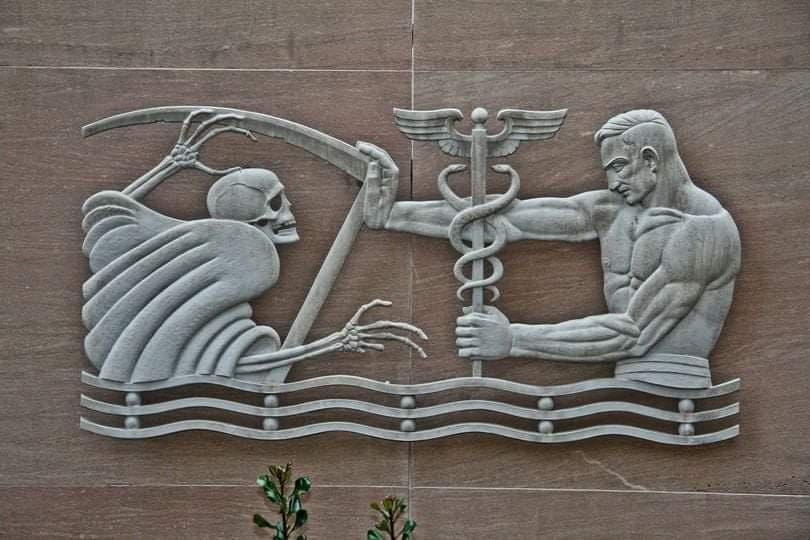A Tale of Two Pinpricks
Life, death, and the privilege of forgetting
Sara, the pediatric nurse, is quiet and efficient. I start telling my daughter a story about a little girl in a faraway kingdom - who coincidentally shares her name and appearance with my daughter. By the time the little girl is talking to her pet unicorn Coco, Sara has already swabbed a portion of my daughter’s thigh. When Coco responds in an annoyingly nasal voice (a dad speciality), the needle goes in and the contents of the syringe starting coursing through my daughter’s veins.
My daughter has a sudden look of confusion, caught between Coco’s response and a sharp pain in her thigh. I hold my breath hoping the distraction has worked. Sadly, it hasn’t. My daughter’s lips furrow in an adorable pout, start to quiver, and I instantly recognize what’s coming next. She lets out an ear piercing scream, tears welling down her doe shaped eyes, and I instantly scoop her up, shushing and consoling her with surprisingly effective platitudes like, “I know!”, and “It’s okay!”. Within a minute the full throated sobs subside into sniffs and within a couple of minutes more, they subside as my daughter is distracted by the colorful sticker Sara has handed to her.
As we head back home in an Uber, with my daughter happily stuffing blueberries into her mouth by the handful, I am filled with a sense of wonder. How easy it is that with little more than a pinprick, she has now gained increased resistance to 3 diseases - diphtheria, pertussis and the dreaded tetanus. In a few minutes we will be back home, I will hand her off to my visiting in-laws and go back to analyzing numbers in a spreadsheet - the very definition of mundane. But as I watch her, my feeling of wonder is tinged with a sense of wistful regret, because what is a routine event for most hides an unseen ghost that has rooted itself deep into my family’s psyche.
Around half a century ago, in faraway Madras (now Chennai), there was a young man. He was a fresh graduate, the eldest son in a privileged family with a well known physician father and eight younger siblings. The weight of expectations on a person in his position in a conservative Tamil family is huge, but by all accounts he was more than equal to it. However, the most mundane experiences in life often lead us down unexpected paths, and it was no different for him. One day he simply happened to prick his hand on a rusty nail. He thought nothing of it. Washed the blood off his hand and continued with his day. Little did he know that an unseen monster had found its way into his body.
The 2.5 micrometer long bacterium Clostridium tetani is benign in the soil or in animal intestines. But under the right conditions, for example deep inside a cut caused by a rusty nail, C. tetani spores begin to germinate and release the toxins tetanolysin and tetanospasmin. Tetanospasmin spreads via the lymphatic system and bloodstream throughout the body and causes some unpleasant symptoms. It begins with lockjaw - a condition that restricts the opening of the mouth. This is followed by spasms of the abdominal muscles and the limbs. Muscle spasms continue for several weeks and they can often cause blocked airways or damage to the nerves that regulate breathing, heart rate or other organ functions.
And so it was that the young man from Madras found himself at the mercy of this tiny organism and eventually succumbed to the disease known as tetanus. The man was my eldest uncle. A man everyone in my family still remembers with reverence and longing. My paternal grandfather, another man I never met, went into a deep depression and quit his thriving medical practice for close to two years. I can only wonder what the aftermath on my grandmother and all my other uncles and aunts was. When my father talks about his late brother, his voice becomes heavy and carries an undertone of sadness that the decades haven’t fully quelled. This unexpected event has shaped my family in unseen ways, and we carry the shadows of that dark tragedy even now, a half a century later, all around the world.
And it is because I carry these shadows that the current news of my own province of Ontario being a global hotspot for measles is particularly jarring. Rampant misinformation and an unjustified distrust in science has led to records drops in vaccination rates. My family carries the memory of a preventable disease that the world has fought to control. And now, here, in one of the wealthiest and most medically advanced places on earth, a disease we had all but vanquished is returning - not because of a failure of science, but because of a failure of collective memory and trust. This is the 'privilege of forgetting' in action. A societal amnesia so profound that unfounded fears of a life-saving pinprick have become greater than the fear of a child struggling to breathe.
Later at night, as I watch my daughter drift to sleep, I linger for a few moments by her bed. I think about my grandfather and the countless fathers who came before him and who looked upon their sleeping children just like me. The little pinprick earlier in the day is a distant memory but in a small way it is a personal act of healing, an act of defiance. It is an act guided by logic and reason yes, but also by tragedy and love that flows across millennia. It is an act that stands in the face of death and tells it, not today.


great post- the story of Thatha’s eldest brother is a tragedy and I am glad that somebody has taken the time to document it